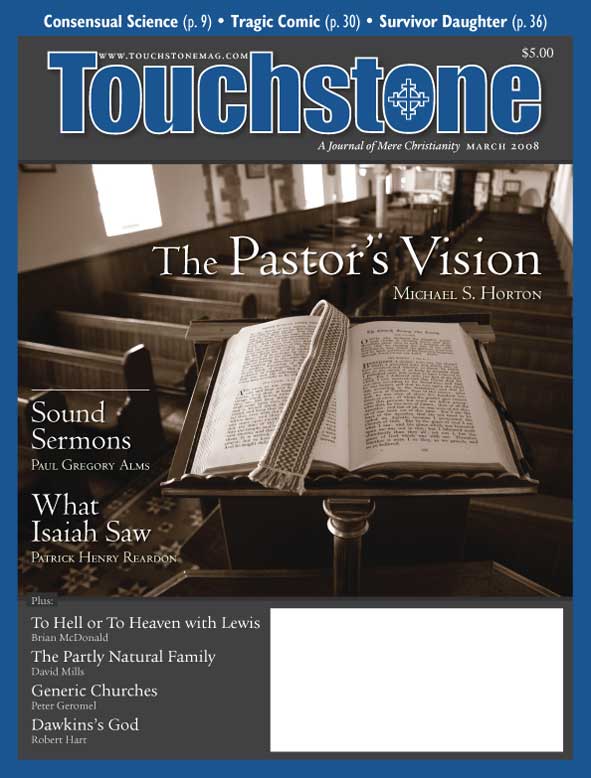Book Review
Philosopher’s Tome
The Tasks of Philosophy:
Selected Essays, Volume1
Ethics and Politics:
Selected Essays, Volume 2
by Alasdair MacIntyre
Cambridge University Press, 2006
(Vol. 1: 248 pages, $24.99, paperback;
Vol. 2: 252 pages, $25.99, paperback)
reviewed by Stewart Goetz
The problem for a reviewer of almost 500 pages of Alasdair MacIntyre’s stimulating essays is deciding which to summarize and comment on. Because he incisively discusses and critiques the reigning philosophical orthodoxy in both the academy and the public square today (what is usually referred to as “naturalism”), I will devote this brief review to his thoughts about it.
MacIntyre, presently Senior Research Professor at the University of Notre Dame, is a member of the American Academy of Arts and Sciences, a Fellow of the British Academy, and the author of many books, including the classic After Virtue.
The Tasks of Philosophy and Ethics and Politics contain a treasure of 22 essays, written from 1972 to 2002, on a wide variety of subjects in metaphysics, ethics, and politics, including chapters about first principles, the ends of life, moral relativism, natural law, and toleration.
Lost Questions
MacIntyre’s approach to these subjects is characteristically Aristotelian/Thomist in nature, and his depth of insight about issues in modern philosophy makes these works well worth the read (though, reader beware, the read is not always easy).
As MacIntyre makes clear in his response to Pope John Paul II’s encyclical letter Fides et Ratio, one, if not the primary, task of philosophy is to articulate and pursue answers to questions posed by human beings about the nature of the world and our place in it. “We move towards that truth by asking what, if anything, the meaning of our lives is.”
He believes that the majority of philosophers today all too often imprison their readers within their own textual world because they do not inquire about a world (and the ends of human life) separate from and uninterpreted by their texts. “The world becomes text-as-interpreted-by-so-and-so.”
Members of the philosophical majority develop philosophies that reduce all questions, including those concerned with the truth about the purpose of life, to “technical or semi-technical questions” about what truth and life are. Philosophy for them is primarily and sometimes exclusively the “exercise of a set of analytic and argumentative skills” for its own sake.
Though some philosophers, for example those in the Aristotelian/Thomist tradition, manage “to send us from the text back into encounter with the world about which the text speaks,” they are a minority. How did philosophy reach the point where texts are the world and questions about the meaning of our lives are lost?
As MacIntyre analyzes the situation, the explanation must include the topic of first principles. “Nothing is more unacceptable in recent philosophy than any conception of a first principle” universal in scope in the sense that it is not “relativized to social contexts and individual purposes.” The exclusion of universal first principles is closely related to the complete elimination of the concept of a goal or end, a telos, because
subscription options
Order
Print/Online Subscription
Get six issues (one year) of Touchstone PLUS full online access including pdf downloads for only $39.95. That's only $3.34 per month!
Order
Online Only
Subscription
Get a one-year full-access subscription to the Touchstone online archives for only $19.95. That's only $1.66 per month!
bulk subscriptions
Order Touchstone subscriptions in bulk and save $10 per sub! Each subscription includes 6 issues of Touchstone plus full online access to touchstonemag.com—including archives, videos, and pdf downloads of recent issues for only $29.95 each! Great for churches or study groups.
Transactions will be processed on a secure server.
more from the online archives
calling all readers
Please Donate
"There are magazines worth reading but few worth saving . . . Touchstone is just such a magazine."
—Alice von Hildebrand"Here we do not concede one square millimeter of territory to falsehood, folly, contemporary sentimentality, or fashion. We speak the truth, and let God be our judge. . . . Touchstone is the one committedly Christian conservative journal."
Support Touchstone
—Anthony Esolen, Touchstone senior editor









